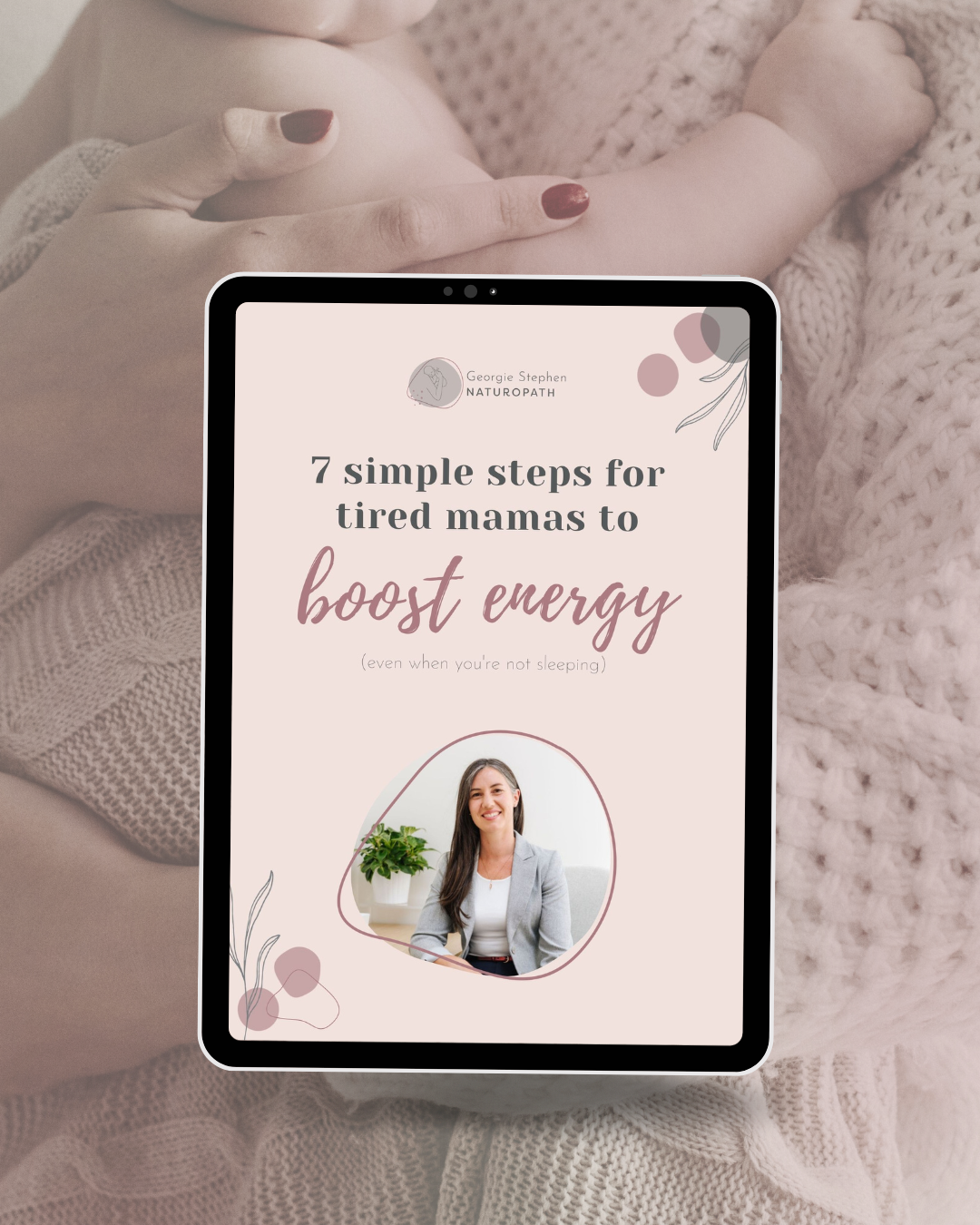Healing from postpartum depletion is about so much more than just finding the right supplement, drinking more coffee, or waiting until your baby is finally sleeping through the night. There is so much more to it than this and sadly the most important aspects of healing aren’t spoken about nearly enough, leaving tired, sleep-deprived mothers on their own to try and figure it out
What it really takes is a holistic approach to your health and wellbeing, one that acknowledges and incorporates all the many factors that influence your health as a mother and a woman, from your physical body, including hormones, blood sugar regulation, and nutrient deficiencies to your emotional and mental wellbeing, as well as your social circumstances and place in community, rebuilding a village of support, connection with a sense of purpose in your mothering work, and finding the joy in the journey.
Disclaimer:
The information provided in this blog is for your personal or other non-commercial, educational purposes. It should not be considered as medical or professional advice. We recommend you consult with a GP or other healthcare professional before taking or omitting to take any action based on this blog. While the author uses best endeavours to provide accurate and true content, the author makes no guarantees or promises and assumes no liability regarding the accuracy, reliability or completeness of the information presented. The information, opinions, and recommendations presented in this blog are for general information only and any reliance on the information provided in this blog is done at your own risk.
Realistic timeframes for healing
Before we explore the 5 steps you need to heal from postnatal depletion, it’s important to set some realistic timeframes, because it won’t magically happen overnight.
The healing process usually happens in multiple different stages, occurring across many months (at a minimum; sometimes more, depending on how depleted you are upon starting this journey).
I don’t believe there is a quick-fix solution, even if you think that quick fix is going to be your baby sleeping through the night. While it is true that for some mothers, baby sleeping longer stretches can improve their energy and well-being quite quickly, if we are talking about true postnatal depletion this usually runs much deeper than just sleep alone.
In my clinical work and in my online community membership, Mother Nourish, I have supported many mothers whose babies start sleeping through the night and yet they’re still exhausted and depleted. They often seek my support after their baby has started sleeping through because it’s only then they start to question, ‘shouldn’t I be feeling better by now?’
See this related blog: Mothers of wakeful babies, are you making this common mistake?
Step 1: Get a thorough postpartum assessment
The first step on the journey to overcoming depletion is having a thorough assessment of your health done, meaning at the very least you have some postpartum blood work done.
Ideally, and not everyone has access to this kind of support, you would also work with a practitioner who is experienced in caring for mothers postpartum, particularly through postnatal depletion, and who is skilled at interpreting blood work through an optimal lens.
Sadly, all too often I will start working with a mother who has already reached out to her primary care provider for support with her exhaustion, for example to her GP, and was told something to the effect that it’s normal to feel exhausted when you’re a new mum or you have a wakeful baby.
But I’ve seen so many examples when I advocate for my client to get proper postpartum blood work completed and the results come back showing clear imbalances around hormones and nutrient deficiencies that would, at best, be making things much harder than they needed to be, or at worst, the main underlying cause for their suffering.
You can read more about the most important blood tests to get here in this blog post: 5 blood tests every new mother needs.

Step 2: Nourish your body
Nutrition is one of the core pillars that makes up the foundation of our overall health; throughout all of life but especially in early motherhood when the demands on your body and mind may be greater than ever before.
Of course, it’s easy to talk about the importance of eating in a way that truly nourishes your body – and many of the mothers I work with are aware of what they need to do to nourish their body, but it’s much more difficult to execute in the context of being a tired, depleted mother when the precious resources of time, energy, and support are often in short supply.
For these reasons, nourishing yourself is often one of the first things to get forgotten about in this season, and nutrient deficiencies are a key feature of postnatal depletion.
The uncomfortable truth is that if you aren’t able to keep up with fuelling and nourishing yourself, your body will eventually reach a point where it doesn’t have the right building blocks and nutrients to keep up with all the demands placed on it – from the broken sleep to breastfeeding to keeping up with little ones to managing the mental load, and everything else in between, all of these demands require nutrients.
The result is symptoms of deficiency begin to pop up, energy levels plummet, hormone imbalances can appear, and eventually you will hit burnout & depletion.
You might find these blog resources useful if you want to learn more about nourishing your body:
Step 3: Protect your energy
There are countless ways that as new, busy, or sleep-deprived mothers we are giving away our energy. Every day we are giving and giving and giving, and rarely topping our levels up again.
I like to think of your energy as being like a bank account, where your balance is your energy level. The amount of money you have in the bank is your energy reserves available to respond to the things you need to do each day and night, to keep up with your little ones, to be focused and present, and manage all of your responsibilities.
Every day we make withdrawals from our ‘energy’ account. We soothe little ones overnight through broken sleep. We breastfeed on demand. We anticipate everyone’s needs. We plan and shop and cook. We co-regulate. We skip meals and ignore our own needs. We do it all ourselves. We research. We worry. And on and on it goes.
These withdrawals might have been going on since back in pregnancy, or even preconception depending on your health history.
We can replenish this energy bank balance through things like sleep, rest, personal time, nourishment, gentle exercise, nurturing our nervous system with relaxation time, creativity, connection with loved ones, and more.
But, ask yourself, when are you making deposits into your account? When are you topping up that balance?
Sadly, too many of us are not topping up our account. Which is certainly not for lack of wanting to or trying to. It’s not your fault. We are mothering inside social structures that were not set up to support mothers and families. We’re mothering without our village, in isolation in nuclear families. We have outside pressures from family, and cultural beliefs about what it means to be a good mother. We lack the support, time, and energy to be able to prioritise ourselves, and the message we see everywhere is that ‘your needs as a mother are not important’.
There is an appalling lack of emphasis on maternal wellbeing in our modern society.
Ultimately, you end up with a bank account balance that drains rapidly. Maybe you even go into overdraw, where you’re on borrowed energy through things like overconsuming coffee or running on adrenaline. Then comes the depletion and exhaustion.
This is why healing from postnatal depletion truly requires a holistic approach that supports your physical well-being as well as considering and addressing your social circumstance and place in community to overcome some of these barriers and allow you the space and permission to prioritise your own needs more each day.
If this step rings true for you, you might like this blog here: Is ‘perfect’ mothering draining your energy? 5 ways it might be weighing you down
Beyond this, there are also some important physical factors that can be draining your energy, like nutrient deficiencies, hormone imbalances, barriers to energy production within the body, foods or drinks that aren’t working for you, nervous system dysregulation, and poor quality sleep (which is distinct from broken sleep- more on this below).
// FREE GUIDE //
7 simple steps for tired mamas to boost energy
(even when you’re not sleeping)

Step 4: Prioritise rest & support your sleep
Now, before you tune out because you think that talking about sleep & rest as a mother of a wakeful baby is a waste of time, let me begin this by saying that it is possible to prioritise rest in other ways beyond just sleep, and even if you have a wakeful baby, you can still take steps to protect the quality of the sleep you are getting.
While you can’t necessarily control the amount of sleep you’re getting or what is happening with your baby’s sleep, you can focus on the thing within your control and take steps to protect sleep quality and prioritise rest in other ways.
This looks like practicing good sleep hygiene, removing barriers that might be impacting our sleep quality, supporting our circadian rhythm (aka our body clock), regulating our nervous system, and being creative about resting beyond sleep.
I’ve written more about protecting sleep here in this blog: Surviving Broken Sleep: the 5 most important things to protect the sleep you are getting.
Prioritising rest will look different for each of us, depending on our daily rhythms, number of children we have, whether we work outside the home, what support we have around us, and many more individual factors. But some ways we can get more creative include:
- Resting when your baby or child is sleeping (i.e. in nap times)
- Looking for ways you can lighten your mental load so there is more time for rest
- Taking micro pockets of rest throughout an otherwise busy day
- Setting boundaries with others
- Work through feelings like mum guilt so you allow yourself permission to rest instead of always ‘doing’
- Have regular ‘zero plans days’
- Relaxation activities like yoga
- And many more
Step 5: Reconnect with yourself
The last thing needed to recover from postpartum depletion is to reconnect with yourself. This might not be the most obvious step needed to overcome depletion, but being connected with a sense of self and a sense of purpose & meaning in your life is an important aspect of your overall well-being as a mother, and when we feel disconnected from self or feel aimless or without purpose, these emotional experiences can spill over into our physical body, contributing, at least in part, to our experience of exhaustion and depletion.
In new motherhood, many women grapple with the shift in identity and changing sense of self that occurs. Upon becoming a mother, we go through something called matrescence, a concept by Aurelie Athan, which describes the process of becoming a mother.
During matrescence, which can sometimes span across years, our identity might feel like it’s broken apart or deconstructed. We might feel lost or irreversibly changed, or conversely, some mothers feel like they ‘find themselves’ or found their calling when they become a mother. Often, the ways in which we defined ourselves in our maiden days no longer fit into our role as mother.
To add, this transition occurs alongside drastic changes in normal routines and rhythms of life. We start carrying the mental load of motherhood, our relationships may shift and change, our priorities shift, and our work or career may pivot too.
All of this can be a lot to navigate, especially when you might not have a lot of time and space to process these changes and explore what your new ‘self’ is like in the season. What served you in the past may not serve you anymore, or you might not be able to implement the tools & strategies that once supported you because of your changed circumstances – less time, less energy, less support.
Ideally, to thrive, all of us need to feel connected to a sense of self, have a sense of purpose or meaning in our life, as well as an outlet to express ourselves creatively.
Reconnecting to yourself in motherhood is not straightforward and it can take time and patience. In fact, the idea of identity and being connected to ourselves is something that is constantly in motion as we move through life – it’s a journey, not a destination.
It might include a lot of self-reflection and personal work, as well as things like:
- Redefining what self-care looks like for you in this season of life
- Carving our regular personal time in your week, with the help of a partner or support person
- Talk therapy with a psychologist or other mental health professional
- Experimenting with creative outlets to nurture this part of yourself
- Appreciating and acknowledging the valuable and meaningful work you do as a mother

Next steps
If you think you are currently experiencing postnatal depletion or are feeling exhausted in motherhood, and you’re not sure where to start or want extra support, I’m here to help. I work with mother 1:1 in my online clinical practice, as well as support an entire community of mother in my online membership Mother Nourish. Through both of these support options, I guide mothers from exhaustion and depletion back to their energy and vitality so they can continue to show up as the mum they want to be while also enjoying the journey along the way.
You can learn more about working with me in these ways here.
Disclaimer:
The information provided in this blog is for your personal or other non-commercial, educational purposes. It should not be considered as medical or professional advice. We recommend you consult with a GP or other healthcare professional before taking or omitting to take any action based on this blog. While the author uses best endeavours to provide accurate and true content, the author makes no guarantees or promises and assumes no liability regarding the accuracy, reliability or completeness of the information presented. The information, opinions, and recommendations presented in this blog are for general information only and any reliance on the information provided in this blog is done at your own risk.


0 Comments